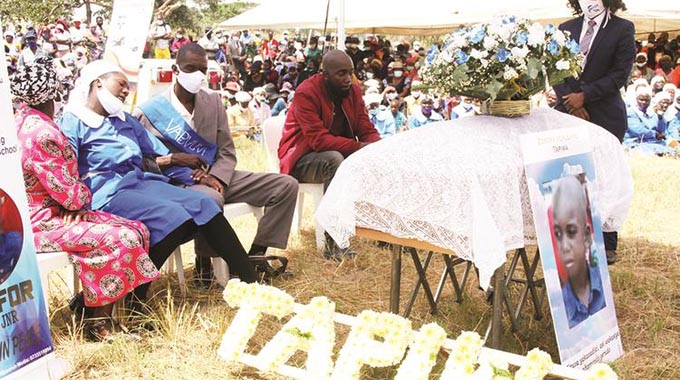Tapiwa Makore: The boy whose murder left community heartbroken

Rutendo Rori
Features Correspondent
It is midday at Nyamutumbu Village in Murehwa, east of Harare, where scores of people from all walks of life have thronged the Makore homestead to witness the burial of seven-year old Tapiwa Makore who was brutally murdered. The burial is taking place after seven months of mourning and waiting.
Minutes later, as the hearse arrives at the homestead, darkclouds begin to gather. Up to now, the sky had been postcard-perfect, but it is suddenly changing.
The beautiful cocktail-blue shade is beginning to darken into gravel-grey.
Large pillows of clouds are forming, blotting out of the old gold colour of the sun. Light showers start falling. Eventually, the rain drops fade and the sun comes out again, casting slanted beams of light across the tents. As the undertakers remove the coffin from the hearse, silence hangs in the air. The only sound is the muffled sobs of those grieving.
Their cold, empty eyes are fixated on the coffin, wishing so desperately that Tapiwa would spring back to life.
Everything is a blur, all that can be heard is the sorrow in the cries of pain and reminisce.
At this moment, reality knocks in Ms Linda Munyori’s head that she is about to bury her son. Once her first tear breaks free, the rest follow in an unbroken stream.
Ms Munyori is being escorted by relatives to her seat in a small tent where Tapiwa’s coffin has been placed.
She begins to cry with the force of a person vomiting on all fours. Ms Munyori’s breath and joy have been sucked out of her body, and replaced with a pain so powerful, her soul is lost in the grief.
Her child is gone, a victim of a gruesome murder. He lost his life allegedly at the hands of close relatives to whom he looked up to. After a prayer and soothing words from pastors, the master of ceremony calls upon Ms Munyori’s sister to give a speech on her behalf.
“Tapiwa’s death came at a time when we did not expect it,” says the sister. “He was a bright young boy who had a promising future. Our greatest wish is that the murderers behind Tapiwa’s death should face the wrath of the law. To all of you gathered here to witness our son’s burial, we are so grateful and please help us to pray. God should punish these murderers accordingly.”
Fellow mothers from the village, and other parts of the country are also present. They have come to show their sisterhood and support.
One of the women, Ms Alice Kutaura, who has walked for more than 10km to Nyamutumbu village said, “Tapiwa was like a son to me. I am also a mother and I can imagine the pain I would experience if I lose my child. I’m sure it is unbearable. I have come here to support a sister. A mother like me.”
Another villager who identified herself as Mai Nyasha of Nyamutumbu village said Tapiwa’s brutal murder instilled fear among villagers.
“This area is no longer as peaceful as it was,” she said. “We no longer know whom to trust. We now escort our kids to and from school. I have personally warned my children against entertaining strangers.”
Tapiwa’s father, Mr Munyaradzi Makore, miserably walks and stands in front of the mourners to recap his son’s life. He sighs and remains silent for a moment.
“Although I am hurt, I would like to thank God for bringing Tapiwa into my life,” he said. “Tapiwa was my only son and was well-behaved. Every moment that I spent with Tapiwa, was full of joy and happiness. He was a cheerful soul.
“I would like to express my gratitude to all those who have been comforting me since Tapiwa’s death. Although it is still hard for us to accept that our son was murdered by our own, I pray to God to continue comforting us and remove the spirit of hatred among us.”
After all prayers are said, memories shared and tears shed, Tapiwa’s coffin is carried back to the hearse.
Yellow roses are loaded into the hearse. Friends and family escort it to the graveside, which is a few metres away from the homestead. The family’s fellow church members sing in unison as they escort the vehicle.
Pallbearers carry the coffin out of the hearse, lay it on rails where it supported on belts so it can be lowered into the ground.
Mourners place roses on the casket. This is the uncomfortably painful part of the grieving process. The family comes to grips with the fact that their child is gone. As the casket lowers into the ground, many tears are shed. Soon after, the bereaved mourners start to disperse as they go back to their respective homes.
This is it. As people walk back to their homes, the future is now in the hands of the Makore family. With a temporary relief from grief, they have hopes that one day their son’s head, which is still missing, will be found.
After seven months of mourning, Tapiwa’s remains were buried last week Saturday, albeit without the head.
Tapiwa went missing on September 17 last year while looking after his parents’ garden. His torso was found the following morning, with some parts, including the head, missing. Six suspects, including relatives, have since been arrested while others were questioned in connection with the kidnapping and murder.
The killers and their accomplices abducted the boy, took him to a mountain before murdering him and then chopping off his head, arms and legs at night.
The latest updates on police investigations show that police now believe an 11-year-old boy from Nyamutumbu Village was paid US$5 to lure Tapiwa from the garden to his uncle’s homestead.
The uncle, Tapiwa Makore (Snr), allegedly gave the boy US$5 plus a T-shirt for the crucial role he played in the murder before warning him against disclosing the matter to other villagers. The boy handed over the money to his mother who kept the secret until everything came out during the investigation.
The uncle together with his herdman Tafadzwa Shamba (40), the first person to be arrested, are in remand prison pending the murder trial.
In November last year, another Makore brother, Thanks Makore (56) was also arrested in connection with the ritual murder, with allegations that he was given the boy’s head and arms. Thanks Makore of Damofalls in Harare has since appeared before a Mutoko magistrate. Recently, the Makore family rejected DNA results that had matched the boy’s jaw, tooth and limb, saying it is impossible for the head to belong to Tapiwa, given that it was found about three days after his death, but did not look new. They called for further DNA tests.
Ms Munyori told The Herald that the family disagreed with the DNA results.








Comments